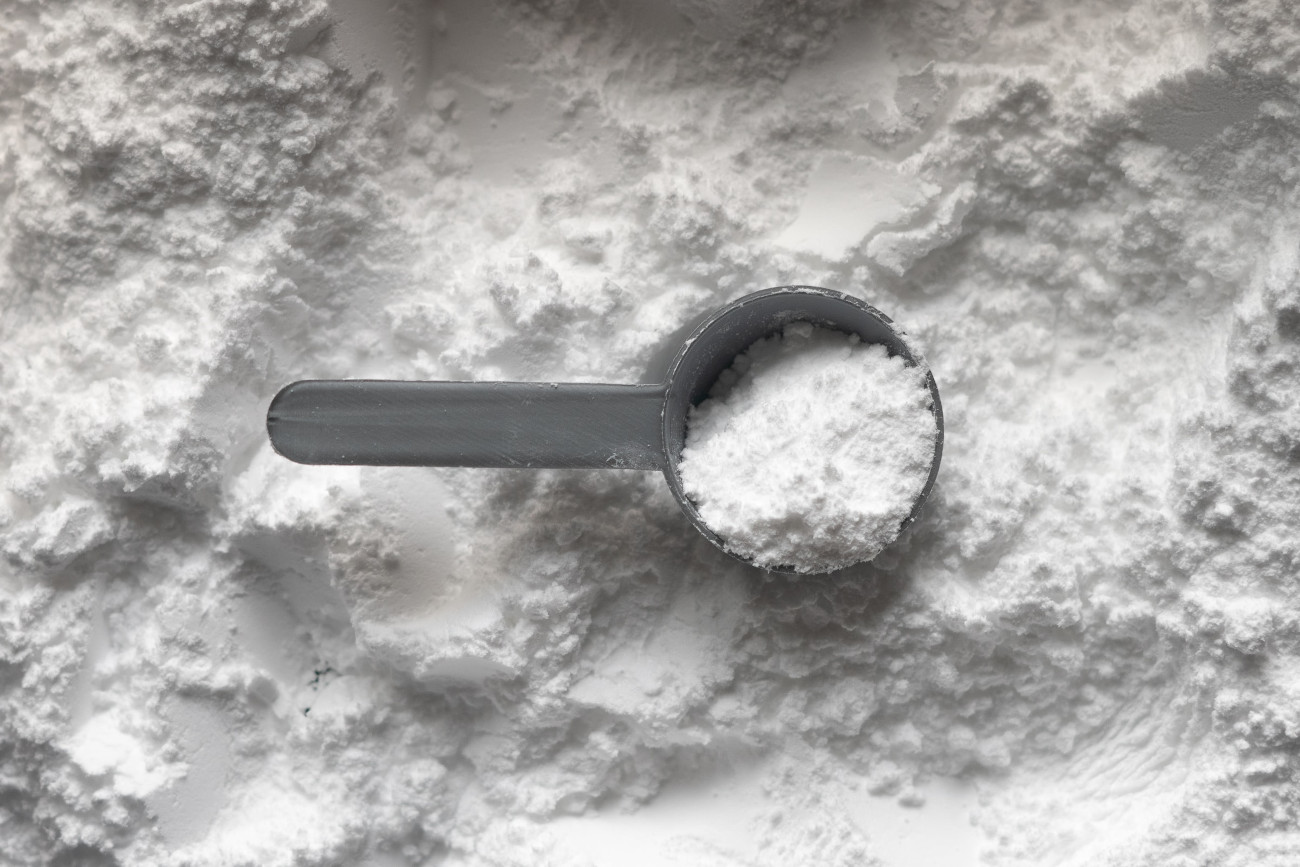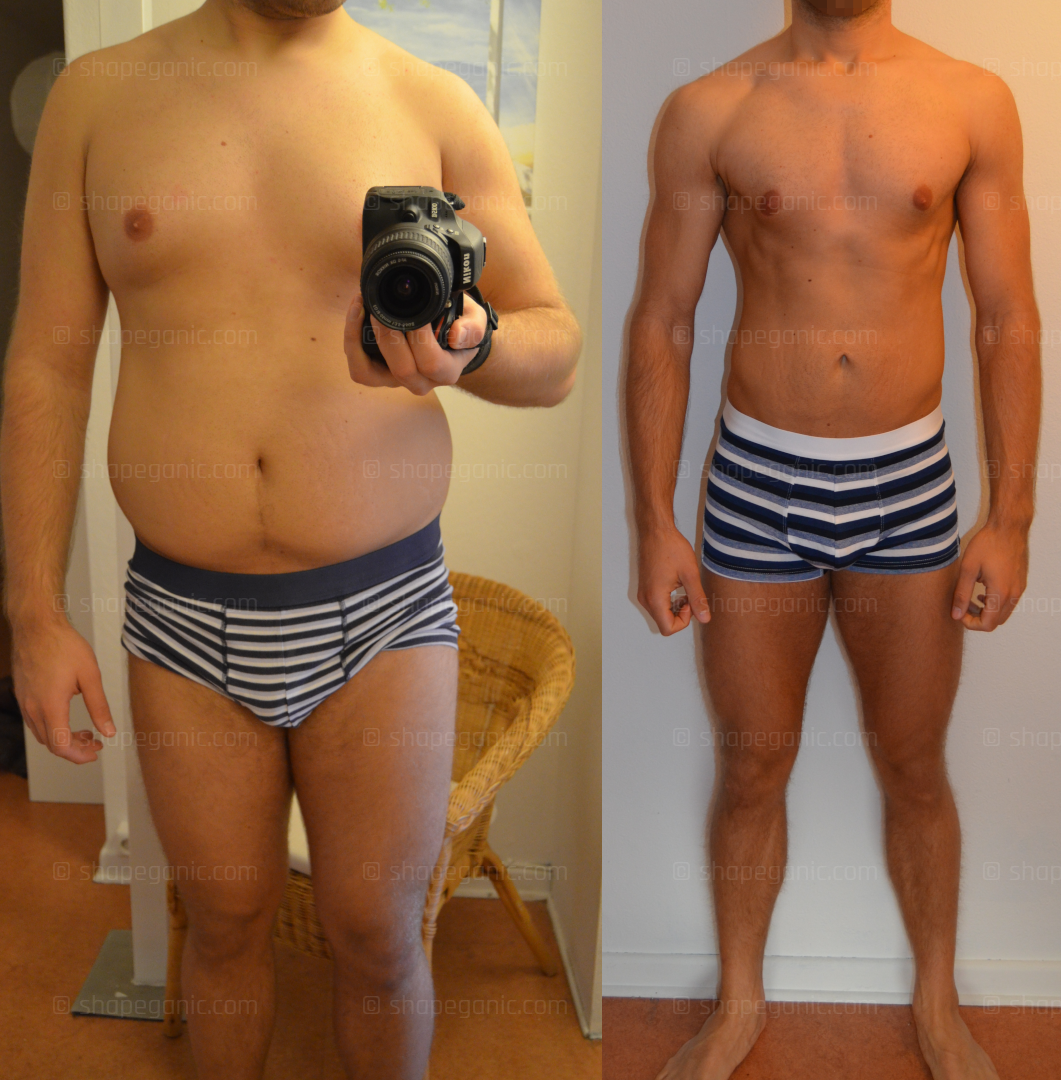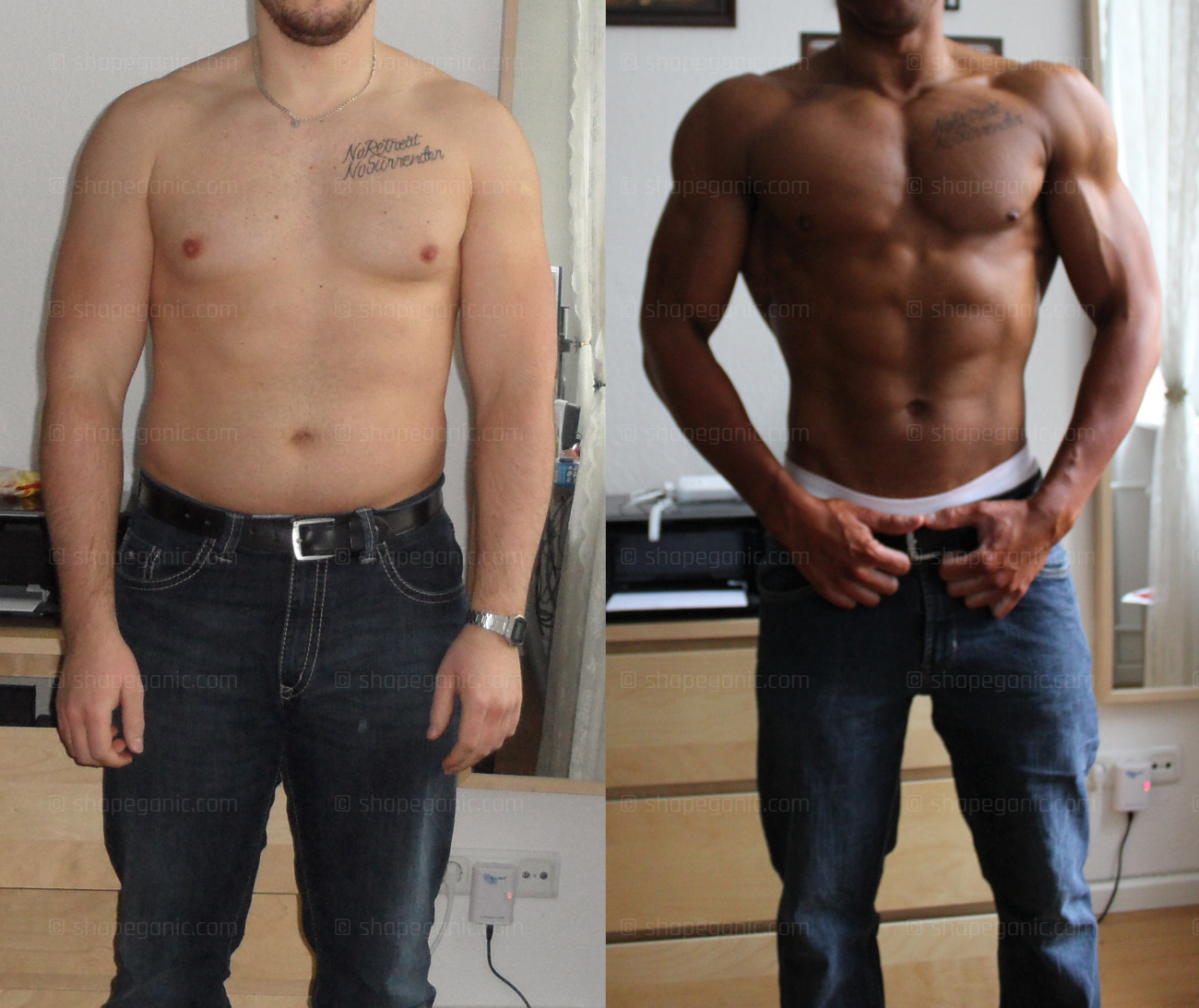Creatine is probably the oldest and best studied dietary supplement on the supplement market. Nevertheless, it is surrounded by many misleading myths. At the same time, there is an alarming amount of misinformation on the internet, with some dangerous recommendations. In this article you will learn everything about creatine, so that you are well informed in the future!
You don’t take creatine? You’re missing these advantages…
Are you aiming for strength or speed? Do you play a sport where fitness, sprinting, running or jump training is an integral part? You want to build muscle while maximizing your workout effectiveness? You should definitely read on, especially if you have been struggling with a workout plateau for a while. Creatine is exactly what you need!
Numerous studies conducted over decades unambiguously proved the performance-enhancing, anabolic and anti-catabolic effect of creatine. The term “anabolic” refers to muscle-building metabolic processes, whereas “anticatabolic” describes the suppression of muscle-degrading processes. Significant increases in performance have been demonstrated, especially in anaerobic activities and interval training. This also applies to classic bodybuilding and fitness exercises such as squats, deadlifts, bench press, leg press, rowing and the like.
This is what creatine does to your body…
Of course, you should not just nod off everything that is claimed in this article. A critical examination is fundamental for a healthy diet and a sensible use of supplements. Therefore, this article will teach you what creatine is, what it is made of and what it is used for in your body.
The source of energy of our cells is called ATP which stands for adenosine triphosphate. The purpose of creatine is to quickly restore depleted ATP, which is why creatine is also referred to as rapidly available energy source. When exercising for up to about 10 seconds, creatine is used to restore depleted ATP, making muscle contractions possible in the first place. So the more creatine we have in our muscle cells, the longer our muscles are able to perform at maximum capacity.
During muscle contraction, one phosphate group of the adenosine triphosphate is split off to release energy, leaving adenosine diphosphate (ADP), a molecule with only two phosphate groups. Creatine phosphate is used to resynthesize adenosine triphosphate by effectively providing the missing phosphate group. Creatine splits off its phosphate group which is absorbed by ADP to resynthesize ATP. The cycle is completed and resynthesized ATP is available for further muscle contractions.
As a result creatine improves your performance with respect to maximum effort movements and exercises. Imagine you are doing squats and you simply can’t do more than 3 reps with a certain weight no matter how hard you try. Such a plateau often can’t be overcome by simply doing more intense workouts. However, if your muscles are enriched with creatine after a few weeks of intake you will most probably be able to do the 4th, 5th or even 6th repetition. As a positive side effect these additional repetitions induce a muscle growth stimulus.
There are two alternatives to using creatine phosphate for ATP resynthesis. Carbohydrates which are stored as glycogen in your muscles and fat are alternative energy substrates. Creatine is the most effective and efficient energy source, though. Especially in conjunction with explosive and highly intense exercises.
This is why your creatine synthesis is insufficient…
Creatine is an endogenous substance which means it can be synthesized by your body. However, exogenous chemical elements have to be provided from outside, such as through food. At first glance it seems like you don’t have to eat food which contains creatine nor take creatine supplements. But is this really the case?
Glycine, Arginine and Methionine
Creatine is composed of the 3 amino acids glycine, arginine and methionine. In this context, the definitions of essential, semi-essential and non-essential are necessary. Essential means that the respective substance cannot be synthesized endogenously, i.e. it must be ingested via food. Non-essential, on the other hand, means that your body can synthesize the element itself. Lastly, semi-essential means that in a normal metabolic state your organism is able to produce the corresponding substance itself in sufficient quantities. In case of an altered metabolism, such as induced by muscle building, heavy exertion or stress, endogenous synthesis may not be sufficient. Also, different metabolic processes may compete with each other in terms of semi-essential substances. In such a situation, the semi-essential substance becomes essential and consequently must also be supplied through food.
We now apply these definitions to creatine. Creatine itself is classified as semi-essential from a scientific point of view. At the same time, some of the amino acids required for the synthesis of creatine are also (semi-)essential. Glycine is not essential, arginine is semi-essential and methionine is essential. The endogenous synthesis of creatine represents a so-called metabolic load. This means that it takes a relatively high effort for your body to synthesize creatine. Also, the amino acids required for creatine synthesis must either be produced by your body (non-essential), or ingested through food (essential or semi-essential). For example, the semi-essential amino acid arginine must be ingested either directly, or at least the respective amino acids required for its synthesis.
In addition to creatine synthesis, there are other metabolic processes, such as muscle building, that compete for semi-essential amino acids. As an athlete, you have an additional need for creatine such as for metabolic processes for which creatine is absolutely necessary and for workouts.
In summary, you should remember that creatine is an essential chemical element that can be synthesized endogenously. However, the amount synthesized only covers the absolute minimum necessary. Workouts increase your creatine demand significantly which is not supplied sufficiently by endogenous synthesis. It is highly recommended to take creatine as a dietary supplement, especially if you are doing intense workouts!
How to Prevent Creatine Deficiency
In the last section you learned that it is quite reasonable to take creatine as a dietary supplement in addition to a balanced diet. Now we want to delve further into the matter and answer the question of whether there is such a thing as a creatine deficiency and if “yes”, what causes it. In some cases, creatine is still classified as non-essential which is highly questionable.
We already know that creatine is a chemical element which can be synthesized by our organism. Sufficient quantities are supplied if our metabolism is in a normal state. We make the naive assumption that creatine is non-essential and a creatine deficiency is practically impossible. However, this statement is only correct if our metabolism is not in an exceptional state which also includes anabolic (muscle-building) processes. This circumstance increases your need for creatine significantly.
A large part of the creatine in your body is stored in your muscles as creatine phosphate. This increases the total amount of creatine required, which must be synthesized endogenously or supplied exogenously, e.g. through food or supplements, on a daily basis. As before, the question remains whether endogenous creatine synthesis is sufficient in such a situation and whether we can thereby continue to classify creatine as non-essential.
Creatine is synthesized from the non-essential amino acid glycine, the semi-essential amino acid arginine and the essential amino acid methionine. Consequently, if these amino acids are not available in sufficient quantities, endogenous creatine synthesis comes to a standstill. In order to ensure endogenous creatine synthesis in all metabolic situations, you would have to supply at least the (semi-)essential amino acids in sufficient quantities through food. However, this circumstance turns out to be a big challenge in practice. We can definitely define this metabolic state as creatine deficiency and accordingly classify creatine as essential! To prevent a possible deficiency creatine must be supplied through food or supplements.
We’re all theoretically affected by this issue but vegetarians and vegans in particular. Plant-based diets generally don’t contain considerable amounts of creatine which means effectively they are an unsuitable creatine supplier. At the same time the amino acids required for endogenous creatine synthesis can also only be inadequately ensured via a plant-based diet. As mentioned above, endogenous creatine synthesis is referred to as metabolic load; the stress on our organism or metabolism is significant! Recent studies suggest that without exogenous creatine intake, certain metabolic processes may be slowed or inhibited such as anabolic (muscle-building) processes.
The endogenous creatine synthesis yields about 1 to 2 grams daily. Depending on your physical strain, a daily creatine quantity of 2 to 3 grams is required, which must be taken in with food. However, numerous scientific studies determined that amounts of 5 to 6 grams are necessary to ensure an unrestrained metabolism.
In conclusion, you should keep in mind that an exogenous creatine supply can be extremely beneficial. You should also consider creatine supplementation to ensure that you do not end up with a creatine deficiency.
This happens if you take creatine as a vegan or vegetarian…
You should also be aware of the fact that your body needs creatine every day even without exercise. The synthesis of ATP involves the anaerobic pathway which means that creatine stored in your organism is used. At the same time, however, only the absolute minimum required is compensated. Your creatine stores are practically never filled or even saturated. This is also the reason why athletes in general and vegans and vegetarians in particular benefit from creatine intake. Increased exogenous intake of creatine, i.e. via food or dietary supplements, can increase the amount of creatine phosphate stored in your muscles by about 20 to 30 %. Vegans and vegetarians benefit the most since their replenishment potential is around 40 %.
Plant based diets effectively don’t provide creatine at all. At the same time the amino acids required for endogenous synthesis of creatine are also barely supplied by diets which are mostly plant based. These two facts yield the huge creatine replenishment potential with respect to vegans and vegetarians. Studies have shown that vegetarians and vegans have creatine levels that are about 10 to 20 % lower than those measured in a mixed diet while there is no gender dependency. Per kilogram/pound of lean mass, women and men have identical creatine levels stored in their muscles.
Conclusion: As a vegan or vegetarian you benefit enormously from creatine supplementation! If you also consider that creatine is extremely cheap, effective and health-promoting, you should not miss these benefits!
Creatine from food - what you need to know…
If you are determined to cover your creatine needs through food, you should definitely read on. The following lists foods containing high amounts of creatine and also which foods contain amino acids required for creatine synthesis.
Creatine is found in significant quantities exclusively in meat as well as in fish. Empirically observable, a non-vegetarian mixed diet provides about 1 gram of creatine per day. If your meat consumption is above average, higher exogenous creatine amounts are obvious. For instance beef and salmon contain 4.5 grams of creatine per kilogram. Consequently, you would have to consume over 1 kg (2.2 pounds) of beef or salmon per day to ingest a daily creatine amount of about 5 grams. It should be obvious that this approach is not feasible in the long run and also not the most inexpensive.
If you are dedicated to cover your creatine needs through food, which might be increased due to working out, either directly or indirectly by consuming appropriate amino acids, you should pay attention to the following. Let’s start with the amino acid glycine, which is necessary for creatine synthesis. The following foods, sorted in descending order, each contain a high amount of glycine: gelatin powder (unsweetened), pumpkin seeds, soybeans (dried), peas (dried), pork, chicken breast fillets, salmon, walnuts, whole wheat flour, eggs, rice (unpeeled), whole grain corn flour and milk (3.7 % fat).
The following enumerated foods contain hight amounts of arginine, again sorted in descending order: pumpkin seeds, peanuts (roasted), pine nuts, walnuts, peas (dried), chicken breast fillets, pork, salmon, buckwheat grains, eggs, whole wheat flour, rice (unhusked), whole grain corn flour, and milk (3.7 % fat).
Lastly, the following enumerated foods contain hight amounts of methionine, sorted in descending order: brazil nuts, salmon, sesame seeds, beef, chicken breast fillets, soybeans (dried), egg, peas (dried), walnuts, whole wheat flour, rice (unhusked), buckwheat flour, whole grain corn flour, milk (3.7 % fat).
Effectively you’re confronted with three options to cover your creatine needs : a) either through foods that provide elemental creatine or b) by eating foods that contain amino acids required for endogenous synthesis. The most effective and simplest solution, and by far the cheapest, is option c): taking creatine monohydrate as a supplement!
Don’t follow this advice…
When creatine hit the market, a supplementation regimen was recommended that consisted of a loading and maintaining phase. This creatine supplementation protocol is called creatine cycling. The loading phase lasts about 5 days and consists of a creatine intake of 5 grams 4 times a day which yields a total of 20 grams of creatine per day. The loading phase is followed by a maintaining phase which is characterized by a daily creatine dose of about 5 to 10 grams. However, the maintaining phase does not represent a continuous intake although this is the most effective supplementation regimen according to current studies. It is limited to about 5 to 6 weeks and is followed by a pause phase of about four weeks.
Comparing a low-dose continuous creatine intake with creatine cycling (especially the loading phase), the maximum creatine level in your cells is reached faster, but only by a few days. However, creatine must be taken over a long period of time to be effective. This circumstance makes the seeming advantage of a loading phase obsolete. Moreover, it is scientifically proven that your muscle cells are satured after 28 days following a creatine supplementation regimen of 3 grams of creatine per day.
Creatine cycling is not only ineffective but also has several disadvantages. Firstly, the probability increases that a large part of the creatine is partially excreted unused as creatinine during the loading phase. High amounts of creatine can yield an equivalently high amount of creatinine which can have a negative effect on your kidneys. Secondly, the creatine-degrading processes are basically increased in order to break down and excrete the excess creatine. This metabolic state must be avoided, as it counteracts the actual objective. Thirdly, the endogenous creatine synthesis is greatly reduced or temporarily stopped altogether. Finally, side effects such as gastrointestinal problems are possible with a high-dose creatine intake, as occurs during a loading phase. Symptoms such as nausea, stomach pain or diarrhea are likely and could easily be avoided completely by a low-dose continuous intake.
A low-dose continuous intake is definitely preferable to creatine cycling and superior in the long run! The amount of creatine in a continuous intake of about 0.05 grams per kilogram (0.023 grams per pound) of body weight and day is considered safe, simple and effective. This yields a creatine amount of 5 grams per day for a person weighing 100 kilograms (220 pounds). As a rule of thumb you should keep in mind that your daily creatine intake should be between 3 and 5 grams.
You don’t need pause phases!
Creatine cycling consists of a loading, maintaining and pause phase. The pause phase lasts approximately 4 weeks. This recommendation is irrational, which is a proven scientific fact, since creatine is an essential component of cellular energy metabolism regardless of supplementation. Creatine is basically an endogenous substance, which is also synthesized endogenously. The effectiveness of creatine supplementation is optimal when taken continuously, which has also been proven by numerous serious studies.
Simple and Effective - Follow this supplementation regimen!
Creatine should be taken every day and without interruption. Only very small amounts are required to keep your muscle cells saturated with creatine. Take 5 grams of creatine monohydrate on a daily basis which is a safe and scientifically recommended amount. It takes about four weeks to get your muscle cells saturated with creatine, as studies have shown applying a supplementation protocol of 3 grams of creatine per day.
 Photo by Karsten Winegeart on Unsplash
Photo by Karsten Winegeart on Unsplash
Creatine intake can be optimized if taken with fast absorbing protein such as whey protein. However, you should definitely consider adding a source of complex carbohydrates. If you prefer using a shaker or blender maltodextrin or alternatively instant oats are extremely beneficial carbohydrates which effectively complement your creatine intake. This strategy causes your body to release insulin, which facilitates the absorption of creatine into your muscle cells while improving protein absorption. An outdated creatine supplementation guideline consists of taking creatine monohydrate with short-chain carbohydrates such as grape juice, glucose, or dextrose. However, this combination has proven to be disadvantageous because short-chain carbohydrates lead to a rapid drop in insulin levels. With this approach, you would miss insulin-related benefits as described above.
Time of intake with respect to creatine is secondary. However, there is a high amount of sources spreading the scientifically outdated rumor that creatine must be taken after workout. Increased workout-related insulin sensitivity is cited as rationale, although many studies have clearly shown that this does not affect creatine absorption or efficacy. Nevertheless, it can be practical to prepare a single shake, which you take after workout, containing creatine in addition to other components such as whey protein.
You should take creatine every day! Workout days and days off are considered equal.
Isn’t creatine too expensive in the long run?
5 grams of creatine cost about $0.50 per day. It is probably the most effective and inexpensive dietary supplement! The proven effectiveness to price ratio is second to none! You should definitely save elsewhere if in doubt!
Keep that in mind when drinking coffee!
If you do research on creatine you’ll most likely come across a recommendation stating that creatine is not supposed to be taken with coffee or caffeine supplements. This is justified with the dehydrating effect of caffeine, which supposedly counteracts creatine-induced cell hydration. Numerous studies have unambiguously disproved this myth.
Don’t waste your money on this…
In addition to creatine monohydrate, there are numerous other creatine products on the market that have been supplemented with additives that are supposed to optimize the creatine effect or absorption. However, once creatine has reached the muscle cell, it absolutely does not matter which additives the supplement manufacturers have added. Likewise, numerous studies have been able to clearly prove that products like Kre-Alkalyn, Creatine AKG, Creatine HCL, Creatine Matrix, and whatever other buzzwords there are, have no additional effect. Except of course that they strain your wallet unnecessarily.
You are skeptical? Then let’s just pick Kre-Alkalyn as an example which is basically creatine monohydrate mixed with alkaline powder. It’s advertised effect is increased stability of creatine in liquids, such as gastric acid, which theoretically maximizes absorption during digestion. However, numerous studies have proven that the absorption of creatine is relatively fast, so that a decomposition of creatine monohydrate into creatinine does not occur or is negligible. There is absolutely no benefit in taking overpriced products such as Kre-Alkalyn. Creatine monohydrate is inexpensive, most effective and everything you’ll every need.
Taking a high-quality synthesized creatine monohydrate, preferably products containing Creapure, is absolutely sufficient and maximally cost-effective. So don’t be fooled the next time you browse or scroll through a fitness magazine. It is also irrelevant whether you take creatine as powder or capsules. However, the latter is considerably more expensive, but has no additional effect.
Creatine works for you too!
In some cases, athletes report that they do not notice any effect from creatine intake. This may be due, among other things, to the fact that they actually already consume enough creatine through food and thus their muscle cells are saturated. Another conceivable cause is that the intake is irregular and thus no above-average creatine level can be built up.
Basically, it can be stated that creatine is generally effective, even if you do not perceive it immediately. In fact, it is often observed that athletes stop creatine supplementation before clearly measurable effects can evolve. The reason for this is usually impatience, which is often accompanied by irregular intake. Of course, the effect of creatine varies from athlete to athlete. This depends mainly on how saturated your muscle cells already were before supplementation. But even a relatively small increase of 10% can improve your recovery in the long term, cause anti-catabolic effects and break your previous performance barriers.
This is what you have to consider in case of an injury!
In case you can no longer stress certain muscles due to an injury, make sure to continue your creatine regimen. Creatine has an anti-catabolic effect which indirectly affects strength maintenance. Anticatabolic effects can be paraphrased as muscle preserving and muscle breakdown preventing. Sports scientists have also studied the effect of taking creatine when there is a decline in strength values after a long injury-related break which could actually be regained much faster with creatine supplementation. Until resumption of your workout, you should definitely continue taking creatine, in order to maintain the muscles and strength that you have built up.
After a long injury, creatine will also help you rebuild and develop your muscles faster in terms of size and strength levels. The same applies to workout breaks in general. So regardless of the cause of the break, you should continue your creatine intake as usual!
This is what creatine does to your brain…
Creatine is also responsible for the provision of energy in your brain by resynthesizing adenosine triphosphate. When awake, ATP is broken down until all 3 phosphate molecules are separated. Adenosine eventually remains, which has a sleep-inducing effect. By taking creatine, you provide your brain with more energy reserves, which leads to an increased state of alertness and a correspondingly increased cognitive performance. This effect means that you are less susceptible to stress and tension, which can be a cause of sleep deprivation. Your rational thinking ability is on a measurably higher level, you can consequently master logical challenges better. With regard to sleep deprivation, research groups have also been able to demonstrate an improvement in body coordination, as well as increased testosterone levels compared to the control group.
Key takeaways
You read this article because you wanted to learn about creatine. Either you heard the term a lot and got curious, or you were wondering if this supplement is something for you. But what are the most important aspects you should take away? Let’s just summarize the most important things:
- Creatine is a highly effective and highly efficient energy carrier of your cells.
- Creatine can significantly increase your power output.
- Creatine can help you build muscle and overcome plateaus.
- Creatine can boost your cognitive performance.
- Your body can synthesize creatine itself, but this amount is usually not enough for athletes!
- To prevent creatine deficiency, you should consider taking creatine on a sustained basis.
- Especially as a vegan and vegetarian, you should seriously consider taking creatine permanently!
- Take 5 grams of creatine monohydrate every day and stay away from creatine cycling!
As an Amazon Associate I earn from qualifying purchases. However, the price remains unchanged for you. Thanks to the revenue, ShapeGanic is available to you at no cost.

 Photo by
Photo by 

 Photo by
Photo by 

